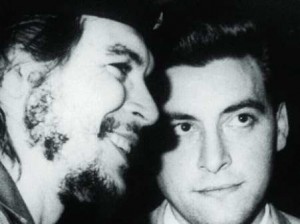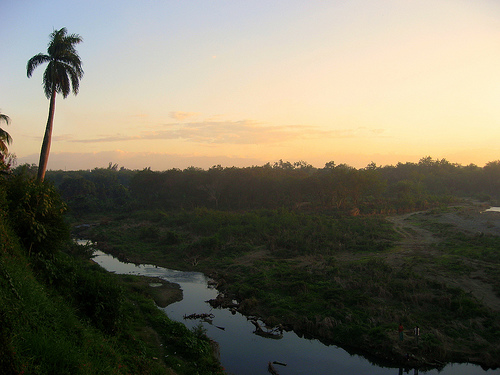The rapid and ill-fated revolutionary history of the Argentine journalist Ricardo Masetti begins in 1958 when he traveled to Cuba, sent by Radio El Mundo de Buenos Aires, to interview Fidel Castro and also Ernesto “Che” Guevara in the Sierra Maestra. His interview with Fidel in the Sierra, about the same time that Herbert Matthews, his feat is more important – and least known-journalism. Matthews had a halo around it came from the Spanish Civil War, he carried the prestige stunning New York Times. Masetti, had nothing, is when he gets in the open in the maze Batista. This is where emotionally involved with the rebels while identifies with his politics.
In January 1959 he returned to Cuba with his wife and children, invited by Che. Participate in “Operation Truth”. It is the first original project director of the Cuban news agency Prensa Latina posed continental break the monopoly of information. “We are objective but not impartial, because you can not remain impartial between good and evil …” said Masetti.
Masetti agencies knew nothing. Prensa Latina is a creation driven by the growing influence of Castro and his advisers communists (USSR, China, etc.) and Che. From the beginning of the revolutionary government and the Latin American news crew had immense journalistic resources, teletypes working full time, while in every country in Latin arose a branch. PL growth is most rapid in the history of journalism. Eighteen months after its creation had branches in every American capital, London, Paris, Geneva, Prague; agreements signed with Tass, CTK, Hsin Sua, Egyptian and Indonesian agencies, gave a global level. As negotiator, showed an unsurpassed flexibility Masetti: getting that Americans will open teletypewriter channels (whose rent Cuban government never even paid) to Buenos Aires, Santiago, Rio, Caracas, Washington, New York, that the Russians would lend equipment detection and listen, that the Chinese will build a transmission plant, which “L Express” in Paris and the “New Statesman” London cede all American rights for tiny sums. Over one hundred customers in Latin America and many hundreds in socialist countries, a news volume comparable to the U.S. agencies. Collaborate on it got the best of the intelligentsia of the time, Jean Paul Sartre, Simone de Beauvoir, Waldo Frank, Wright Mills, Gabriel Garcia Marquez, Rodolfo Walsh, Paco Urondo, Juan Carlos Onetti, among many others.
In the early months of 1961, due to infighting waiver Prensa Latina address. But during the Bay of Pigs invasion, at the request of Fidel, returns briefly to the direction of the agency. Participate later interrogations Cubans invading Cuba at Playa Giron.
A year after that meteoric empire had collapsed. In every country in Latin, the diplomatic break imposed by the United States was preceded by the closure of the agency. A PL infighting dealt the final blow. Affiliates Communists mounted within the agency a real conspiracy anti-Masetti, disguising of ideological struggle. Masetti temporized as he could, finally met them, but could not against a veiled conspiracy that hid the true plans of Castro ‘Massetti use’ other ‘convenient fronts “of fighting that followed the original long-term plans of Fidel Castro and their Soviet advisers, then hugging by Che and that cost him his life in Bolivia later.
Since his departure from Prensa Latina, his post fight will be closely related to the revolutionary plans embraced Fidel, Che and his advisers, Masetti intensely passionately supports the plans that were set out in Algeria and then it would bring Back in Argentina.
Algeria will start from late 1961 to the early months of ’62, where he worked with the Algerian National Liberation Front, accumulating experiences that they will be forming as future guerrilla leader.
By 1963, in Oran Salta jungle and become commander Second, Masetti led the People’s Guerrilla Army (EGP), an initiatory experience on armed organizations in the country that developed with many drawbacks, included the shooting of two of its members.
In organizing the guerrilla front in the northern province of Salta, Che has the unconditional support of his most trusted men. At the core of the EGP Cuba receives military training by several officers of guerrilla experience. Finally Che receive the order from separate groups of the Argentina-Bolivian border. In May 1963 the first group of EGP is on the border, is composed of Ricardo Masetti-Second-Commander, Captain Hermes Peña-Cuban and Che-personal escort Federico Mendez-arms and military training, Ciro Bustos-secret keys and cryptology and Leonardo Werthein-doctor-all under the direction of the commander Manuel “Redbeard” Pineiro Losada (Department Castro Minist.Interior America). They receive logistical support from some members of the Bolivian Communist Youth Federation, some of which integrate after Che’s guerrilla in Bolivia.
When all is lost, when the fury of the forest has virtually wiped his group, Masetti fills his backpack and goes into the woods, uphill. No returns, everyone knows you can not go back. Masetti disappears, her body has not been found. Is taken as the date of his disappearance on April 21, 1964. He was 35 years old and was lost forever in the forest Salta Argentina, had the task of waiting for “Martin Fierro”, pseudonym of Che Guevara in Operation “Shadow”. The rural guerrillas in Salta is one of Argentina Cuban history has been forgotten both in academia as well as in the political organizations of the left.
Sources:JorgeMasetti/Walsh/ArgetinaNews/InternetPhotos/TheCubanHistory.com
Argentina, Cuba: Jorge Ricardo Masetti
The Cuban History/Arnoldo Varona, Editor
ARGENTINA Y CUBA: JORGE RICARDO MASETTI
La vertiginosa y malograda historia revolucionaria del periodista argentino Ricardo Masetti comienza cuando en 1958 viaja a Cuba, enviado por Radio El Mundo de Buenos Aires, a entrevistar a Fidel Castro y al tambien argentino Ernesto “Che” Guevara en la Sierra Maestra. Su reportaje a Fidel en la Sierra, casi al mismo tiempo que Herbert Matthews, es su hazaña más importante – y más desconocida- del periodismo. Matthews tenía alrededor una aureola que venía de la Guerra Civil Española; llevaba consigo el prestigio imponente del New York Times. Masetti, no tenía nada, es cuando se mete por la libre en el laberinto batistiano. Es ahí donde se involucra afectivamente con los rebeldes a la vez que se identifica con sus ideas políticas.
En enero del 1959 regresa a Cuba junto a su mujer y sus hijos, invitado por el Che. Participa de la “Operación Verdad”. Es el primer director del proyecto original cubano de una agencia de noticias continental Prensa Latina que plantea romper con el monopolio de la información. “Somos objetivos pero no imparciales, porque no se puede permanecer imparcial entre el bien y el mal…” decía Masetti.
Masetti no sabía nada de agencias. Prensa Latina es una creación guiada por la creciente influencia de Castro y sus asesores los comunistas (URSS,China,Etc.) y el Che. Desde el principio del gobierno revolucionario ya el equipo periodistico latinoamericano contaba con inmensos recursos periodisticos, teletipos funcionando a tiempo completo, mientras en cada país de América surgía una sucursal. El crecimiento de PL es el más vertiginoso en la historia del periodismo. A dieciocho meses de su creación tenía filiales en cada capital americana, en Londres, en París, en Ginebra, en Praga; convenios firmados con Tass, CTK, Hsin Sua, las agencias egipcias e indonesa, le daban un ámbito mundial. Como negociador, Masetti mostraba una insuperable flexibilidad: conseguía que los norteamericanos le abrieran canales de teletipo (cuyo alquiler nunca el gobierno cubano llegó a pagar) con Buenos Aires, Santiago, Río, Caracas, Washington, Nueva York; que los rusos le prestaran equipos de detección y escucha; que los chinos le construyeran una planta transmisora; que “L Express” de París y el “New Statesman” de Londres cedieran todos sus derechos latinoamericanos por ínfimas sumas. Más de cien clientes en América Latina y muchos centenares en los países socialistas; un volumen noticioso comparable al de las agencias norteamericanas. Logró que colaboraran en ella lo mejor de la intelectualidad de la época, Jean Paul Sartre, Simone de Beauvoir, Waldo Frank, Wright Mills, Gabriel García Márquez, Rodolfo Walsh, Paco Urondo, Juan Carlos Onetti, entre muchos otros.
En los primeros meses de 1961, producto de luchas internas renuncia a la dirección de Prensa Latina. Pero durante la invasión a Playa Girón, a pedido de Fidel, regresa momentáneamente a la dirección de la agencia. Participa posteriormente de los interrogatorios a los cubanos que invaden a Cuba en Playa Giron.
Un año después ese meteórico imperio se había desmoronado. En cada país de América, la ruptura diplomática impuesta por Estados Unidos fue precedida por el cierre de la agencia. Una lucha interna asestó a PL el golpe definitivo. Afiliados comunistas montaron en el seno de la agencia una verdadera conspiración anti-Masetti, disfrazándola de lucha ideológica. Masetti contemporizó mientras pudo; al fin, les hizo frente, pero no pudo contra una velada conspiracion que escondia los verdaderos planes castristas de ‘utilizar a Massetti’ en otros “convenientes frentes” de lucha que seguian a largo plazo los originales planes de Fidel Castro y sus asesores Sovieticos, luego abrazados por el Che y que le costaria la vida en Bolivia mas tarde.
A partir de su alejamiento de Prensa Latina, su puesto de lucha va a estar íntimamente relacionado a los planes revolucionarios abrazados por Fidel, el Che y sus asesores, Masetti intensamente apoya con pasión los planes que se plasmaron en Argelia y que luego lo traerían de regreso a la Argentina.
Partirá a Argelia, desde fines del 1961 hasta los primeros meses del ’62, donde colabora con el Frente de Liberación Nacional Argelino, acumulando experiencias que lo van a ir formando como futuro jefe guerrillero.
Hacia 1963, en la selva salteña de Orán y convertido en comandante Segundo, Masetti encabezó el Ejército Guerrillero del Pueblo (EGP), una experiencia iniciática en materia de organizaciones armadas en el país que se desarrolló con muchos inconvenientes, incluyó el fusilamiento de dos de sus miembros.
En la organización del frente guerrillero en el norte de la provincia de Salta, el Che cuenta con el apoyo incondicional de sus hombres de mayor confianza. En Cuba el núcleo del EGP recibe instrucción militar a cargo de varios oficiales de experiencia guerrillera. Finalmente reciben la orden del Che de partir en grupos separados a la frontera argentina-boliviana. En mayo de 1963 el primer grupo del EGP se encuentra en la frontera, esta compuesto por Ricardo Masetti-el Comandante Segundo-, Hermes Peña-capitán cubano y escolta personal del Che-Federico Méndez-armamentos e instrucción militar, Ciro Bustos-claves secretas y criptología y Leonardo Werthein-médico- todos bajo la direccion de el comandante Manuel “Barbarroja” Pineiro Losada (Del Departamento America del Minist.Interior de Castro). Allí reciben el apoyo logístico de algunos miembros de la Federación Juvenil Comunista boliviana, algunos de los cuales integrarán después la guerrilla del Che en Bolivia.
Cuando todo está perdido, cuando el furor de la selva ha aniquilado prácticamente a su grupo, Masetti llena su mochila y se interna en la espesura, monte arriba. No vuelve, todo el mundo sabe que no puede volver. Masetti desaparece, su cuerpo no ha sido encontrado. Se toma como fecha de su desaparición el 21 de abril de 1964. Tenía 35 años y se perdió para siempre en la selva argentina de Salta, tenía la misión de esperar a “Martín Fierro”, seudónimo del Che Guevara en la Operación “Sombra”. La guerrilla rural en Salta es una parte de la historia cubano-argentina que ha quedado en el olvido tanto en los ámbitos académicos, como así también en las organizaciones políticas de izquierda.
Sources:JorgeMasetti/Walsh/ArgetinaNews/InternetPhotos/TheCubanHistory.com
Argentina, Cuba: Jorge Ricardo Masetti
The Cuban History/Arnoldo Varona, Editor





